One Shot Adventures
One Shot Adventures
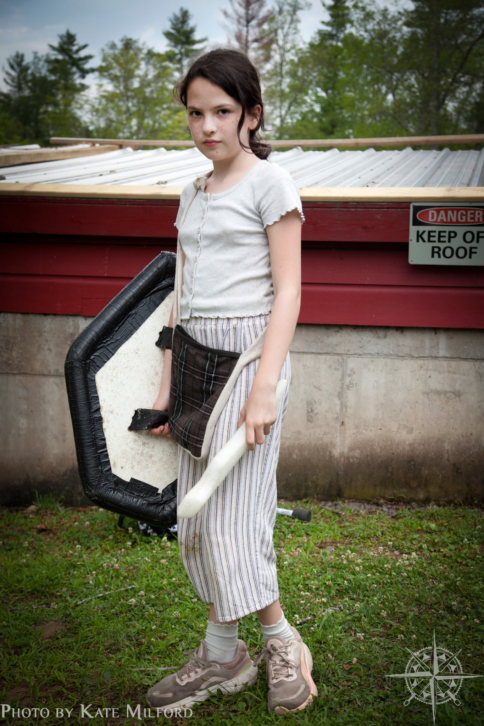 I have previously written here about our campaign style play and the linked worlds we inhabit and return to. I have personally had great play experiences in our campaigns, deep and meaningful connections to characters I have been able to reunite with over periods of months, years, or, with our recent resurgence of Finals games, even decades. This type of play is wonderful and deep in a very special way, but as anyone who has played a long term roleplaying campaign in any format is likely to be familiar with, campaign play is dependent upon an investment of time in a character and story that it can become very difficult to let go or pivot away from that character should they die. This, along with some logistical and creative realities, is a big reason why the majority of the Adventure Games that we run at Wayfinder are One Shots. Singular visits to a world and a character that we will never physically return to. This singular imagined reality, and the very temporary and short lived nature of it, provides players with an important understanding of their characters, the stakes and expectations within the game, and the stories we are able to tell.
I have previously written here about our campaign style play and the linked worlds we inhabit and return to. I have personally had great play experiences in our campaigns, deep and meaningful connections to characters I have been able to reunite with over periods of months, years, or, with our recent resurgence of Finals games, even decades. This type of play is wonderful and deep in a very special way, but as anyone who has played a long term roleplaying campaign in any format is likely to be familiar with, campaign play is dependent upon an investment of time in a character and story that it can become very difficult to let go or pivot away from that character should they die. This, along with some logistical and creative realities, is a big reason why the majority of the Adventure Games that we run at Wayfinder are One Shots. Singular visits to a world and a character that we will never physically return to. This singular imagined reality, and the very temporary and short lived nature of it, provides players with an important understanding of their characters, the stakes and expectations within the game, and the stories we are able to tell.
LARP is a chance to explore identity. One Shots turn this exploration from a deep dive into a buffet. If you play in three Adventure Games, which in one summer you could achieve with three weeks of camp or just by attending Overnight 4 where we run three fully separate Games in three fully distinct worlds, you are given the chance to play a minimum of three characters. When you have that kind of opportunity, it shifts the dynamic when it comes to risk aversion. Not every hero survives their story. Being in a One Shot often gives us the chance to play out the kinds of scenes that we may shy away from in campaign play. The death of a character who you have spent months or years playing can be a hard thing to stomach, from the personal attachments we form to the very real time investment that cannot be instantly recreated in the next character. One Shots free us from that. In the words of Sparrow, a long time camper of ours, “I love the feeling of sweet desperation. You get these small little bite sized pockets of beauty and bonding, and I usually walk into these games knowing most of my loved ones in the game will die. I think it creates this sweet vibe that I love!” The short nature of the game opens the players to options that may normally feel scary, unavailable, or too heavy to consider.
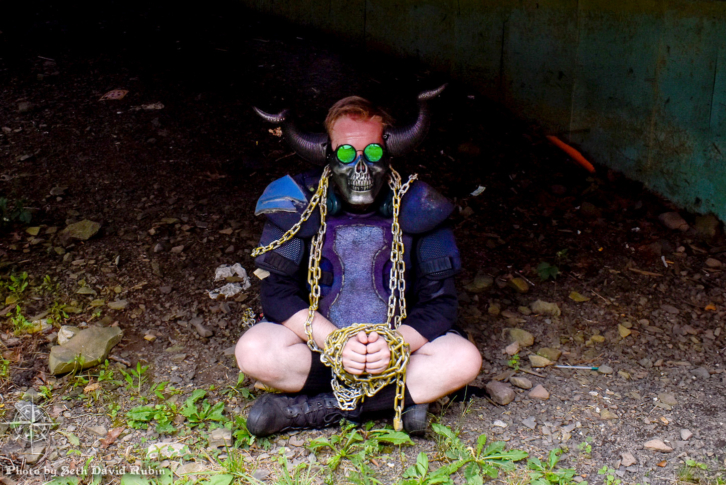 We are able to be the noble and self sacrificing hero, the one left holding back the forces of evil as our friends escape. We can play the fool, and walk knowingly into a trap that will mean our end. We can experience in real time being the one who is lost, the one who is mourned by those left behind. Having personally survived my own character’s funeral on more than one occasion, I can tell you that it is a powerful and lasting experience. With so little time for our characters to live regardless of our choices, we are given the chance to take chances and risk it all. One Shot play gives us the gift of all of these things that can be so terrifying, whether in campaign play or in their very real and permanent occurrences in real life. In the words of another of our campers, Eloise, “I really enjoy the temporary parts of it, since they aren’t very long. You are only seeing a part of the story of your character, not the whole book. On the out of character side you make connections in-game with people you might’ve never connected to otherwise because you’re not afraid to explore, no matter how poorly it goes, it’ll just be temporary.” The scope of choices you can make and your opportunities to connect with people are magnified. You are not with the same group of players every time. You have the chance to hide from demons with one group of players, and then turn around in your next Adventure Game and fight to overthrow the kingdom. The bonds you build last. The characters and stories don’t have to.
We are able to be the noble and self sacrificing hero, the one left holding back the forces of evil as our friends escape. We can play the fool, and walk knowingly into a trap that will mean our end. We can experience in real time being the one who is lost, the one who is mourned by those left behind. Having personally survived my own character’s funeral on more than one occasion, I can tell you that it is a powerful and lasting experience. With so little time for our characters to live regardless of our choices, we are given the chance to take chances and risk it all. One Shot play gives us the gift of all of these things that can be so terrifying, whether in campaign play or in their very real and permanent occurrences in real life. In the words of another of our campers, Eloise, “I really enjoy the temporary parts of it, since they aren’t very long. You are only seeing a part of the story of your character, not the whole book. On the out of character side you make connections in-game with people you might’ve never connected to otherwise because you’re not afraid to explore, no matter how poorly it goes, it’ll just be temporary.” The scope of choices you can make and your opportunities to connect with people are magnified. You are not with the same group of players every time. You have the chance to hide from demons with one group of players, and then turn around in your next Adventure Game and fight to overthrow the kingdom. The bonds you build last. The characters and stories don’t have to.
 Despite the modern reality of franchise films, not every story needs a sequel. Sometimes, the world can be saved for good. One Shots, as they exist as complete stories, provide us with a kind of permanent resolution that it can be difficult to find in continued play experience. There is no reopening of old wounds. There is no return of a villain or a problem. The world has been saved from the demons who sought to destroy it, full stop. That kind of finality is satisfying. The world is safe. Our sacrifices mattered. The world we played in can turn on, no new problems on the horizon. It is useful and important to tell stories that mirror life, with a world that is complex and changing, never fully saved and never done improving. It is also deeply important to remind ourselves that we can win battles. We can triumph. We can overcome. We can die, and mourn, and love and fight all in the course of a few hours. Each one of us contains an endless number of characters. One Shots give us the chance to give more of them a chance to see a little daylight. Not every hero has to fight in endless battles. Sometimes, we can simply stay safe.
Despite the modern reality of franchise films, not every story needs a sequel. Sometimes, the world can be saved for good. One Shots, as they exist as complete stories, provide us with a kind of permanent resolution that it can be difficult to find in continued play experience. There is no reopening of old wounds. There is no return of a villain or a problem. The world has been saved from the demons who sought to destroy it, full stop. That kind of finality is satisfying. The world is safe. Our sacrifices mattered. The world we played in can turn on, no new problems on the horizon. It is useful and important to tell stories that mirror life, with a world that is complex and changing, never fully saved and never done improving. It is also deeply important to remind ourselves that we can win battles. We can triumph. We can overcome. We can die, and mourn, and love and fight all in the course of a few hours. Each one of us contains an endless number of characters. One Shots give us the chance to give more of them a chance to see a little daylight. Not every hero has to fight in endless battles. Sometimes, we can simply stay safe.
Written by Judson Easton Packard July 2024

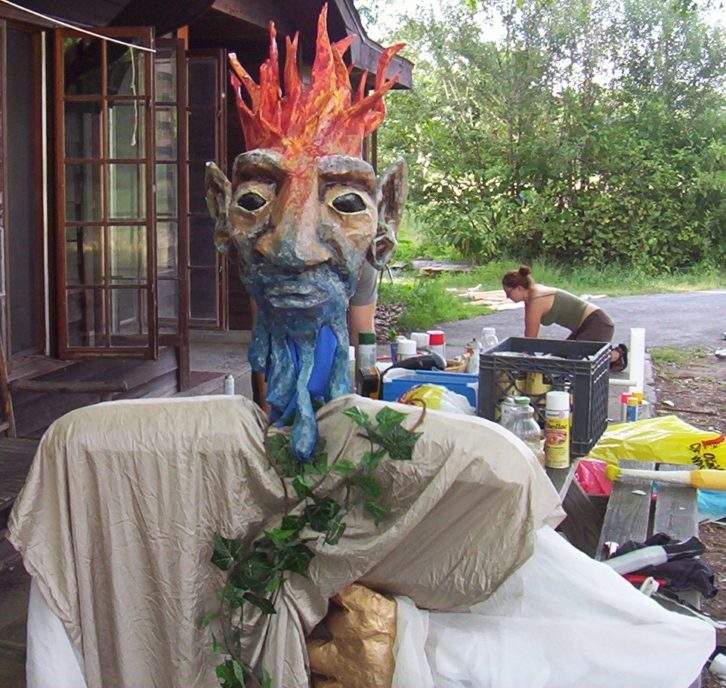 Wayfinder grew off a similar organization called Adventure Game Theater, which has since been absorbed into Wayfinder. Our programming grew directly from the systems and work that AGT did. Many parts of our system were built around DND spells and other systems that people were familiar with, but as with many LARPs our systems have evolved to reflect the people in the community and the ways in which we play our games. The Adventure Game as a LARP system started in 1986 (before Magic the Gathering for some nerd street cred) and has been being updated, tweaked, and adapted ever since. There is no one person who created our system (which contains a base system of 5 classes and over 100 abilities, with other auxiliary powers and classes available for use in less standard game settings and several variations on improv magic instead of our class based system). There have been a number of people who have worked on it over the years. The current system that is in play was largely developed and updated by Conor Gillespie, Griffin Johnston, Jack Covell, and Brennan Lee Mulligan in the mid aughts, but it has since been updated by our administrative staff and is undergoing regular updates and reworkings to keep it feeling fresh and in line with the way that games our played today!
Wayfinder grew off a similar organization called Adventure Game Theater, which has since been absorbed into Wayfinder. Our programming grew directly from the systems and work that AGT did. Many parts of our system were built around DND spells and other systems that people were familiar with, but as with many LARPs our systems have evolved to reflect the people in the community and the ways in which we play our games. The Adventure Game as a LARP system started in 1986 (before Magic the Gathering for some nerd street cred) and has been being updated, tweaked, and adapted ever since. There is no one person who created our system (which contains a base system of 5 classes and over 100 abilities, with other auxiliary powers and classes available for use in less standard game settings and several variations on improv magic instead of our class based system). There have been a number of people who have worked on it over the years. The current system that is in play was largely developed and updated by Conor Gillespie, Griffin Johnston, Jack Covell, and Brennan Lee Mulligan in the mid aughts, but it has since been updated by our administrative staff and is undergoing regular updates and reworkings to keep it feeling fresh and in line with the way that games our played today!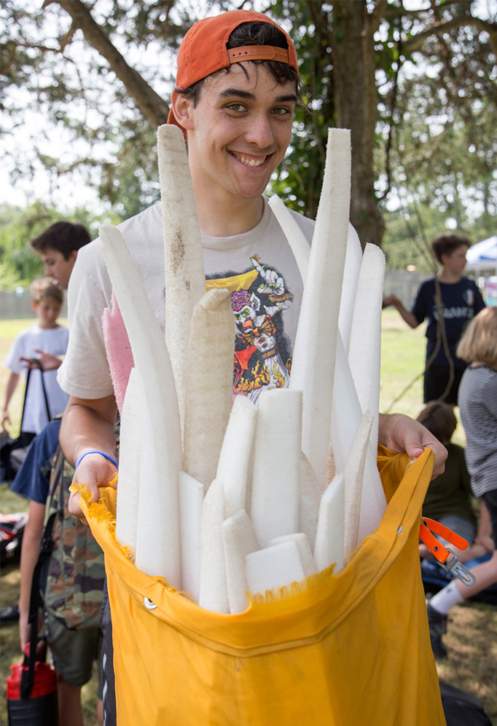 The swords are central to what we do. It is the easiest way to grasp LARP for an outsider. It can be hard to take on a character, to tell a story, to invest in the small details of a world that isn’t your own, but it is very easy to understand that getting hit with a sword is bad and getting a chance to swordfight is fun. On top of the access to different types of play, swords are a hugely appealing thing to many participants (new, returning, young, and old). There aren’t that many chances to safely hit each other with things or to simulate battle. As purely an experience, it’s a fun and fairly unique one (not a ton of drop in LARPs that are easily accessible for kids). For many of us who want to be active but are not necessarily the most athletic, it provides the chance to get to play in some athletics with some leveling in the reality of there’s always the chance to fight your way out. Add on top the ability to scream and die together, live out the epic battles you’ve seen or read in so many books, movies, and video games, and the list of reasons to love swords stretches on almost endlessly.
The swords are central to what we do. It is the easiest way to grasp LARP for an outsider. It can be hard to take on a character, to tell a story, to invest in the small details of a world that isn’t your own, but it is very easy to understand that getting hit with a sword is bad and getting a chance to swordfight is fun. On top of the access to different types of play, swords are a hugely appealing thing to many participants (new, returning, young, and old). There aren’t that many chances to safely hit each other with things or to simulate battle. As purely an experience, it’s a fun and fairly unique one (not a ton of drop in LARPs that are easily accessible for kids). For many of us who want to be active but are not necessarily the most athletic, it provides the chance to get to play in some athletics with some leveling in the reality of there’s always the chance to fight your way out. Add on top the ability to scream and die together, live out the epic battles you’ve seen or read in so many books, movies, and video games, and the list of reasons to love swords stretches on almost endlessly.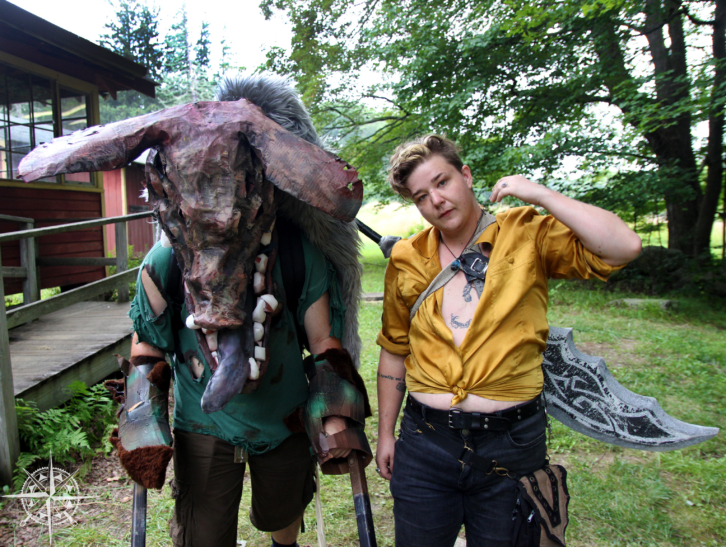 Campaign play allows us to spend more time with a particular character and story line, to carry our characters forward through a series of events and construct singular narratives around the different stories they find themselves at the center of. Characters always provide us a reflection of ourselves, a vision into another way that we could be and interact with those around us. Returning to a character can feel like coming home to yourself. Characters can share a lot with us, they may be good, they may be evil, but whoever they are, the distance they provide from our everyday selves brings a newness into the body that can be very welcoming. The longer you play as a particular character, the more of that character’s life you will hold in your memory.
Campaign play allows us to spend more time with a particular character and story line, to carry our characters forward through a series of events and construct singular narratives around the different stories they find themselves at the center of. Characters always provide us a reflection of ourselves, a vision into another way that we could be and interact with those around us. Returning to a character can feel like coming home to yourself. Characters can share a lot with us, they may be good, they may be evil, but whoever they are, the distance they provide from our everyday selves brings a newness into the body that can be very welcoming. The longer you play as a particular character, the more of that character’s life you will hold in your memory.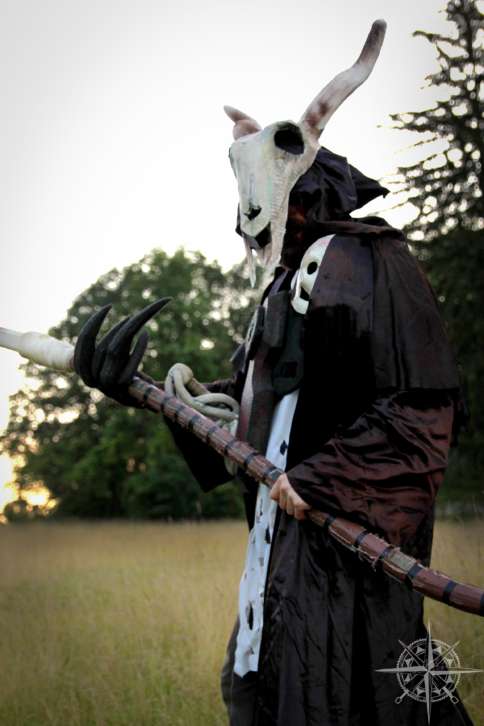 Last summer we returned to having linked Campaign style Adventure Games as a part of our summer offerings. Over the course of two weeks of camp players were introduced to a world that our staff had collaborated to build the mythology of. People built characters that had to face off against an ancient evil, a lich who had found a way to once again crawl out of death. In our first week characters fought an increasingly desperate battle to stem the tides of undeath, to hold this evil back before it swallowed the world. They were successful, but at the price of a large number of their own, including some heroes they had grown to care about. In the second week we opened with a funeral for one of those characters who had passed. Campers and staff alike gave impromptu elegies that brought a solemn warmth to the scene, and made it all the more upsetting when the character rose again possessed by the lich. Playing in the same world over the course of multiple weeks, made everything feel more familiar, more lived in. Campers were able to share stories and lore with one another. The world became truly collaborative.
Last summer we returned to having linked Campaign style Adventure Games as a part of our summer offerings. Over the course of two weeks of camp players were introduced to a world that our staff had collaborated to build the mythology of. People built characters that had to face off against an ancient evil, a lich who had found a way to once again crawl out of death. In our first week characters fought an increasingly desperate battle to stem the tides of undeath, to hold this evil back before it swallowed the world. They were successful, but at the price of a large number of their own, including some heroes they had grown to care about. In the second week we opened with a funeral for one of those characters who had passed. Campers and staff alike gave impromptu elegies that brought a solemn warmth to the scene, and made it all the more upsetting when the character rose again possessed by the lich. Playing in the same world over the course of multiple weeks, made everything feel more familiar, more lived in. Campers were able to share stories and lore with one another. The world became truly collaborative. 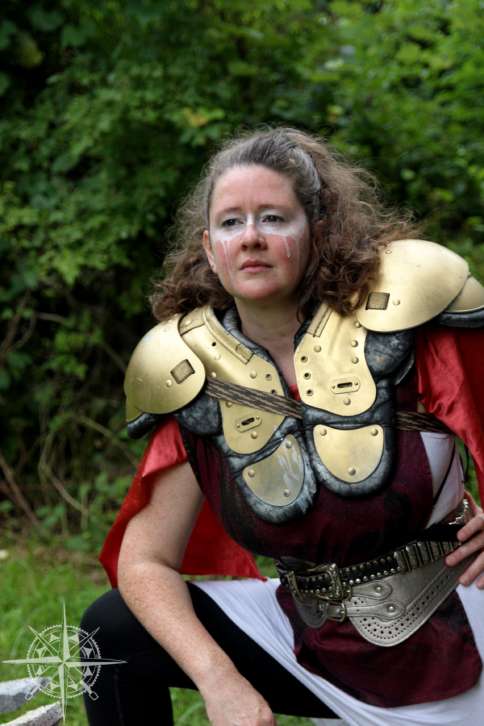 After the summer we had two opportunities to return to our campaign world. At our Adult Retreat we played a prequel that took place in the same world, giving a perspective to characters and storylines from the summer. Many of our staff, having worked over the summer, found themselves getting the chance to play as PCs in earlier storylines that tied into their experiences over the summer. A number of them found this deepened their experience, they already felt connected to the mythology and the chance to build into that world in its early days provided a unique LARP experience for them.
After the summer we had two opportunities to return to our campaign world. At our Adult Retreat we played a prequel that took place in the same world, giving a perspective to characters and storylines from the summer. Many of our staff, having worked over the summer, found themselves getting the chance to play as PCs in earlier storylines that tied into their experiences over the summer. A number of them found this deepened their experience, they already felt connected to the mythology and the chance to build into that world in its early days provided a unique LARP experience for them. 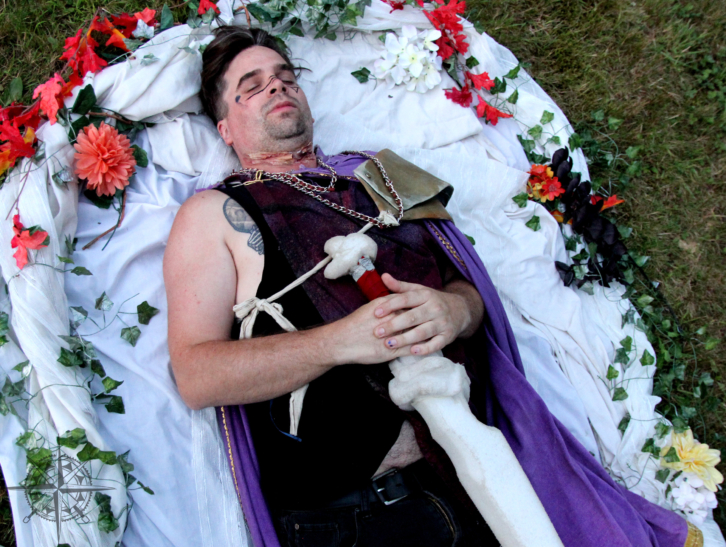 This summer we will be having two more linked games. Building out these games is a fun design challenge. We have to craft two games that are stand alone stories, but played together they show a full story arc, and as with all of our Adventure Games, the storyline that we play wraps up, the campaign does not stretch forward forever. It is a hallmark of our Adventure Games that we build these worlds and these characters, inhabit them, and continue into the next story. This summer at our first two weeks of Overnight Camp we will be playing linked games and hope to see you there! What will you build with us? Where does your story lead?
This summer we will be having two more linked games. Building out these games is a fun design challenge. We have to craft two games that are stand alone stories, but played together they show a full story arc, and as with all of our Adventure Games, the storyline that we play wraps up, the campaign does not stretch forward forever. It is a hallmark of our Adventure Games that we build these worlds and these characters, inhabit them, and continue into the next story. This summer at our first two weeks of Overnight Camp we will be playing linked games and hope to see you there! What will you build with us? Where does your story lead? Always Coming Back Home To You
Always Coming Back Home To You Due to the setup of our community around a summer camp, there is always going to be some change in the people who are attending. People’s lives move forward. They go to college. They get jobs. They move on to whatever the world holds next for them. Spending summers at camp you get used to the rotating nature of the people around you. Every time someone new comes to camp it’s a chance to bring someone new into the fold. It’s always exciting to see what they bring into the space with them. New games. New ideas. There’s also, almost guaranteed, to be a friend who has been long absent. Someone who wasn’t able to be at camp for whatever reasons, or you two just haven’t been at the same weeks. Every camp is a chance to reenter these friendships. The function of being a summer camp means that the majority of the people at camp will not see each other maybe nine months out of the year. The friendships we have suspend in time, they tie to the space we hold at camp. It’s why it’s so easy for us to come and go in each other’s lives, to maintain relevance, as Marika put it so well a few weeks ago. We have grown use to coming home to each other.
Due to the setup of our community around a summer camp, there is always going to be some change in the people who are attending. People’s lives move forward. They go to college. They get jobs. They move on to whatever the world holds next for them. Spending summers at camp you get used to the rotating nature of the people around you. Every time someone new comes to camp it’s a chance to bring someone new into the fold. It’s always exciting to see what they bring into the space with them. New games. New ideas. There’s also, almost guaranteed, to be a friend who has been long absent. Someone who wasn’t able to be at camp for whatever reasons, or you two just haven’t been at the same weeks. Every camp is a chance to reenter these friendships. The function of being a summer camp means that the majority of the people at camp will not see each other maybe nine months out of the year. The friendships we have suspend in time, they tie to the space we hold at camp. It’s why it’s so easy for us to come and go in each other’s lives, to maintain relevance, as Marika put it so well a few weeks ago. We have grown use to coming home to each other. I’ve lived in six states and three time zones. I’ve told myself more springs than I’d like to admit that the coming summer would be my last one at camp, that it was time for me to grow up and move on to a new home. In 2014 I didn’t go to camp for the first time since I started in 2003. The year that followed was one of the hardest, most isolated of my life. There were a lot of external strains that led to this throughout the year as well, but I would be lying if I didn’t notice the weight of not getting to come home to camp and be me. Not having the time to put my stress aside and sit in a circle and fall asleep in the grass when I’m probably not supposed to (OK I’m definitely not supposed to and am probably supposed to be running the circle). Camp is my home. Who knows how long we get to call any one particular place home? If you get the chance to, come back. We miss you.
I’ve lived in six states and three time zones. I’ve told myself more springs than I’d like to admit that the coming summer would be my last one at camp, that it was time for me to grow up and move on to a new home. In 2014 I didn’t go to camp for the first time since I started in 2003. The year that followed was one of the hardest, most isolated of my life. There were a lot of external strains that led to this throughout the year as well, but I would be lying if I didn’t notice the weight of not getting to come home to camp and be me. Not having the time to put my stress aside and sit in a circle and fall asleep in the grass when I’m probably not supposed to (OK I’m definitely not supposed to and am probably supposed to be running the circle). Camp is my home. Who knows how long we get to call any one particular place home? If you get the chance to, come back. We miss you. Recently I’ve spent a lot of time thinking about play and what it is. I’ve been taking a class on play theory (one of many reasons my writing of this blog has lagged so heavily) in which we have been looking at different definitions of play that people have had throughout the years and the implications of each one. Wayfinder is the reason I signed up for the course. Seeing as we talk about and engage in play so much within our community, I wanted to get an idea of what the broader view on the topic was. As we’ve progressed I’ve also been looking at my own beliefs as to what play is, what role it holds in this community, and what play has done for me. I’ll probably write more of the personal responses to play as time passes but for right now I want to look at some of the ways play applies to camp at large.
Recently I’ve spent a lot of time thinking about play and what it is. I’ve been taking a class on play theory (one of many reasons my writing of this blog has lagged so heavily) in which we have been looking at different definitions of play that people have had throughout the years and the implications of each one. Wayfinder is the reason I signed up for the course. Seeing as we talk about and engage in play so much within our community, I wanted to get an idea of what the broader view on the topic was. As we’ve progressed I’ve also been looking at my own beliefs as to what play is, what role it holds in this community, and what play has done for me. I’ll probably write more of the personal responses to play as time passes but for right now I want to look at some of the ways play applies to camp at large.

 Closing circle at camp almost always includes a specific message and call to action: the things we do at camp can be brought out into your regular life. This isn’t to say that you’re going to get everyone you meet to break out into LARPing games at school or in your day to day lives, but instead that much of the work we do on ourselves at camp can be applied to ourselves outside. Personally the comfort and confidence I have found in myself through Wayfinder has allowed me to navigate social situations for the past 14 years of my life. It’s taken a combination of the different types of skills and knowledge I gained through camp in order to be able to cultivate those qualities in myself.
Closing circle at camp almost always includes a specific message and call to action: the things we do at camp can be brought out into your regular life. This isn’t to say that you’re going to get everyone you meet to break out into LARPing games at school or in your day to day lives, but instead that much of the work we do on ourselves at camp can be applied to ourselves outside. Personally the comfort and confidence I have found in myself through Wayfinder has allowed me to navigate social situations for the past 14 years of my life. It’s taken a combination of the different types of skills and knowledge I gained through camp in order to be able to cultivate those qualities in myself. While there has been a lot of discussion of “creating space” on this blog (and generally is at any Wayfinder event), little focus has been given to what kind of space Wayfinder is to begin with. It may seem kind of strange to try and diagnose a space which has no connection to a specific location (our office and storage facility notwithstanding, there is no one place which contains the Wayfinder Experience), but for the purpose of discussion space refers to whatever space we occupy together as a community and not the land itself. Wayfinder exists as a transformational space. The nature of this movement, combined with the variable make up of community members (both staff and participants) at any event, and the type of personal, introspective work we do allows transformations from community members to go unquestioned.
While there has been a lot of discussion of “creating space” on this blog (and generally is at any Wayfinder event), little focus has been given to what kind of space Wayfinder is to begin with. It may seem kind of strange to try and diagnose a space which has no connection to a specific location (our office and storage facility notwithstanding, there is no one place which contains the Wayfinder Experience), but for the purpose of discussion space refers to whatever space we occupy together as a community and not the land itself. Wayfinder exists as a transformational space. The nature of this movement, combined with the variable make up of community members (both staff and participants) at any event, and the type of personal, introspective work we do allows transformations from community members to go unquestioned.
 For this week’s blog, I want to get a little more personal than I feel I have in previous entries. Obviously, anything about camp is something highly personal to me, but I’ve made an effort not to focus on myself or my experiences in these posts. Something Tigre said in his interview struck a chord in me though. I asked him about what he had taken from camp in his personal life, outside of professional skills he’d honed, and he said that Wayfinder had saved his life. I think you’ll find a lot of long term community members who think this, myself included. I’d say that Wayfinder has saved me on no less than two occasions, that I would not be here today if I had not had camp. Even if I had survived adolescence and the hardships I’ve had since (which I highly doubt I would have) the person I’d be would be unrecognizable from the person I am.
For this week’s blog, I want to get a little more personal than I feel I have in previous entries. Obviously, anything about camp is something highly personal to me, but I’ve made an effort not to focus on myself or my experiences in these posts. Something Tigre said in his interview struck a chord in me though. I asked him about what he had taken from camp in his personal life, outside of professional skills he’d honed, and he said that Wayfinder had saved his life. I think you’ll find a lot of long term community members who think this, myself included. I’d say that Wayfinder has saved me on no less than two occasions, that I would not be here today if I had not had camp. Even if I had survived adolescence and the hardships I’ve had since (which I highly doubt I would have) the person I’d be would be unrecognizable from the person I am. The second time I was saved was in 2016. Being a staff member for so long has been incredibly important to me. I’ve had the chance to create space for kids and give back the pieces of my childhood that I treasured so much. In the process I shifted my thinking about camp. It no longer seemed like a place which could contain my struggles. I thought that as a staff member the only thing it had to offer me was the satisfaction of giving that space to our participants. I couldn’t have been more wrong. When I was 16 years old I was sexually assaulted by a good friend. I didn’t start processing it until I was 25 (in 2015). My path back to emotional stability has been long and will probably never be over, but Wayfinder gave me an opportunity to take a step forward in a way I didn’t believe was possible. The summer of 2015 was lonely. I told maybe two or three people at camp about my assault. I didn’t want it to become the focus of anything we were doing. I was minimizing the space that it took up. The effect was that I felt isolated and uncomfortable in one of the few spaces I had ever felt at home. At the last event I worked at our final staff meeting I told everyone that I was an assault survivor, the first time I ever made that kind of a public admission. Last year I set my summer up around being at staff week turning down a position at the Kansas State Young Writer’s Workshop (a program I had been involved in for 2 years). I couldn’t stand to feel that distant from everyone at camp for another summer. Staff Week’s trust workshop was planned almost entirely around creating a space for sharing trauma and hardship. The love that I received in that circle reminded me of the feeling Wayfinder had given me the first time around. That it’s all right to be me, even if that means being hurt.
The second time I was saved was in 2016. Being a staff member for so long has been incredibly important to me. I’ve had the chance to create space for kids and give back the pieces of my childhood that I treasured so much. In the process I shifted my thinking about camp. It no longer seemed like a place which could contain my struggles. I thought that as a staff member the only thing it had to offer me was the satisfaction of giving that space to our participants. I couldn’t have been more wrong. When I was 16 years old I was sexually assaulted by a good friend. I didn’t start processing it until I was 25 (in 2015). My path back to emotional stability has been long and will probably never be over, but Wayfinder gave me an opportunity to take a step forward in a way I didn’t believe was possible. The summer of 2015 was lonely. I told maybe two or three people at camp about my assault. I didn’t want it to become the focus of anything we were doing. I was minimizing the space that it took up. The effect was that I felt isolated and uncomfortable in one of the few spaces I had ever felt at home. At the last event I worked at our final staff meeting I told everyone that I was an assault survivor, the first time I ever made that kind of a public admission. Last year I set my summer up around being at staff week turning down a position at the Kansas State Young Writer’s Workshop (a program I had been involved in for 2 years). I couldn’t stand to feel that distant from everyone at camp for another summer. Staff Week’s trust workshop was planned almost entirely around creating a space for sharing trauma and hardship. The love that I received in that circle reminded me of the feeling Wayfinder had given me the first time around. That it’s all right to be me, even if that means being hurt.